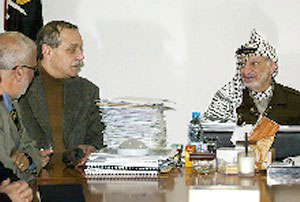Ostensibly, Arafat and Abbas are at odds over whom to name security chief, but at the root of the conflict appears to be Arafat's refusal to relinquish some of his authority. Abbas, in turn, has lost valuable support in Fatah by appointing to his Cabinet several politicians tainted by corruption, and by not bringing in new faces. International mediators have been watching the standoff closely, and appeared to be exerting intense pressure on Arafat to back down. In the night from Tuesday to Wednesday, Arafat received phone calls from Arab League Secretary-General Amr Moussa, Egyptian President Hosni Mubarak, Qatari Foreign Minister Sheik Hamad bin Jassim bin Jabor Al Thani and Greek Foreign Minister George Papandreou, a senior Palestinian official said. Mubarak called twice, and also dispatched his intelligence chief, Suleiman, to the West Bank to mediate. Suleiman's mission was seen as decisive. An official close to the talks, speaking on condition of anonymity, said the Egyptians proposed that Arafat recognize Abbas' sole authority in forming the government and that, in exchange, Abbas promise to consult with Arafat on major decisions involving security, including a future crackdown on Palestinian militias. Abbas has not spoken to Arafat since a stormy meeting Saturday, and his aides said he has not received calls from foreign leaders. The aides, speaking on condition of anonymity, said Abbas is determined to use the time left to him to form a Cabinet. Shaath, the Palestinian planning minister, appeared upbeat Wednesday. "I think we have a big chance in forming the government, and I hope it will succeed," Shaath said after the Arafat-Suleiman meeting. However, Palestinian officials have offered sharply conflicting assessments of the crisis in recent days. In Washington, U.S. State Department spokesman Richard Boucher said Tuesday that it was up to the Palestinians, and not the United States, to choose their leader. However, Abbas should be free to select his Cabinet, Boucher said.. "You don't have an empowered prime minister, you don't have a leadership that's capable of establishing the institutions of a state unless the leaders get to choose the members of their cabinet," Boucher said. President Bush has said he would only present a U.S.-backed plan for full Palestinian statehood within three years once an empowered Palestinian prime minister has been installed. In the West Bank town of Jenin, meanwhile, Israeli troops raided two hospitals Wednesday and arrested two wanted Palestinians from the Islamic Jihad group being treated there, doctors said. In one raid, troops blew up the gate to the private Al Shifa Hospital in Jenin, hospital officials said. The Israeli military said the two men were involved in separate plans to carry out suicide bombings in Israel in the coming days, but provided no details. In the West Bank city of Nablus, another Islamic Jihad member was seriously wounded after opening fire on Israeli commandos trying to arrest him, the army said. The man, Anas Shreiteh, was taken by helicopter to an Israeli hospital. The soldiers were not harmed.
|
